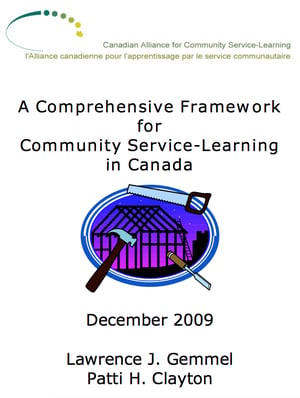Universities and Colleges in Canada are rich in resources that are often in short supply in the community sector: Knowledge, research capacity, and the energy and enthusiasm of students. So how can we mobilize this potential on behalf of our communities?

A few years back I had the opportunity to work with the Canadian Alliance for Community Service-Learning (CACSL) to try to increase awareness of how these resources might be more effectively engaged. While you might not be familiar with the term Community Service-Learning (CSL), you will be familiar with the kinds of “placements” and “internships” that post-secondary students have been doing with community agencies for many years.
There are really two specific types of CSL: Curricular - Placements and projects specifically tied to student courses, and Co-curricular - The purely voluntary involvement of students in community activities. In both cases this is a tremendous learning opportunity for students, who often bring tremendous energy and innovation to the work. The term “Service-Learning”, more widely used in the US, denotes the unpaid and voluntary nature of these engagements, to distinguish them from the paid work experience of Co-op placements which more often take place in government and the private sector. Closely aligned is research activity which engages directly with agencies and often involves students, known as Community-Based Research (CBR)
My own view is that there is tremendous potential in these kinds of Community-Campus activities, but these relationships have not been without their problems. In the past, community agencies sometimes felt “used and abused” when approached by post-secondary institutions to accept student placements, often because they had no resources (computers, desk space, etc) to support the students, the students did not bring needed skills, or proposed projects were not focussed on the agency’s own needs and priorities. However, there is increasing sensitivity to these issues and Colleges and Universities are much more committed now to creating genuine partnerships and longer term engagements.
In A Comprehensive Framework for Community Service-Learning in Canada, a research paper funded by the J.W. McConnell Family Foundation that I co-authored with Patti Clayton, we suggested that CSL operated at the intersection of institutional, community, and student interests and could mobilize many positive outcomes for each constituent. In particular, we felt that the positive contributions of students were often understated, although the learning value of such experiences is well established and documented. If you are interested in pursuing such partnerships, most universities and colleges have offices and programs which can help establish relationships:
http://communityservicelearning.ca/csl-network/csl-and-community-engagement-programs-across-canada/.
Further information and resources about Community Service-Learning can be found at http://communityservicelearning.ca/en/resources.htm while information about Community-Based Research is available from CBR Canada at http://communityresearchcanada.ca/ and Community-Campus Partnerships for Health (CCPH) http://ccph.memberclicks.net/.
For those already engaged in a community-campus partnership, a unique opportunity to make a presentation on your work is coming up at the next C2UEXPO “Citizen Solutions. Better World” which will be hosted in Ottawa by Carleton University on 26-29 May, 2015. There is a Call for Abstracts and Presentations and this year particular emphasis is being placed on inviting participation from practitioners as well as academics. More detailed information is available from the website at http://cuexpo2015.ca and in the attached pdf documents. Note that the deadline for proposals is 12 December.
View attachment here: appel_de_resumes_et_de_presentations_pour_c2uexpo_2015.pdf
View attachment here: c2uexpo_2015_call_for_abstracts.pdf





